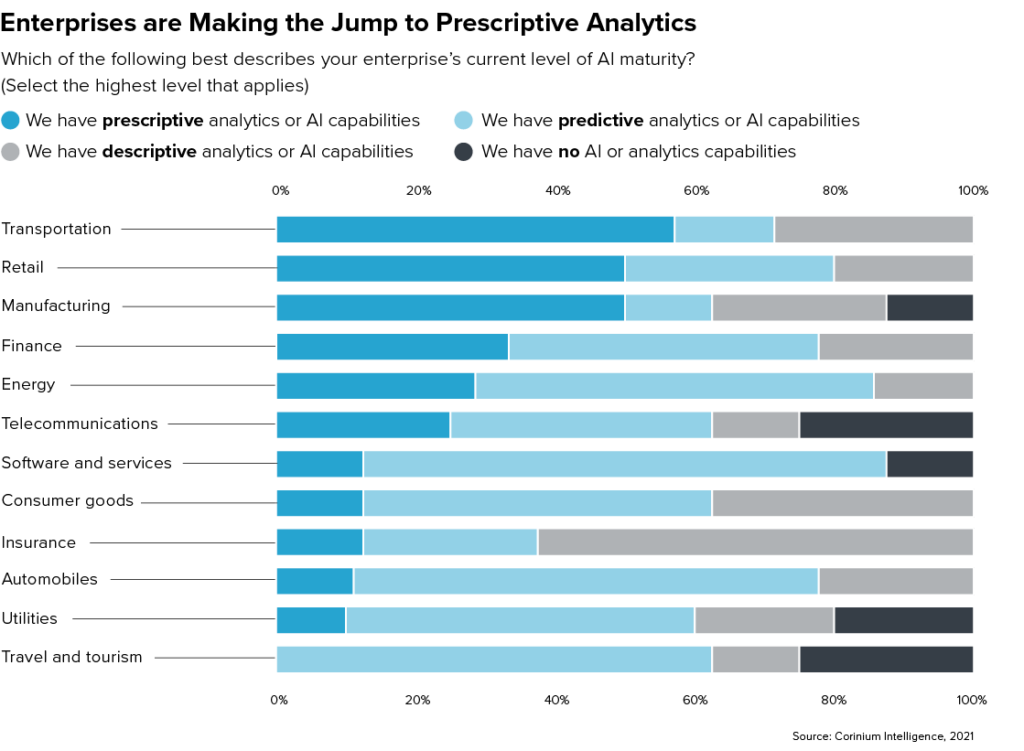How Cloud-Enabled AI will Drive Business Value in the Future

Thanks to technologies including cloud-enabled AI, one in four enterprises have made the jump to prescriptive analytics, while 71% are using AI to generate new revenue streams
There are three major landmarks on the road to AI maturity. The first is using data to describe how things are. The second is using it to predict what will happen next. Then, there’s using data to prescribe the best course of action based on the information at hand.
Our research shows that a growing number of organizations are passing these key milestones on their AI maturity journeys.
In 2018, Gartner reported that 4% of organizations had deployed AI capabilities. Of the 100 data and analytics leaders we surveyed, 69% say their enterprises are at least using predictive analytics or AI models. What’s more, 25% have made the jump to prescriptive analytics.
Besa Bauta PhD, CDO at social care nonprofit MercyFirst, explains: “A few years ago, a lot of this was new. But there are many organizations out there that have pretty much codified providing AI as a service.”
How Cloud-Enabled AI is Driving Business Value Today
With 71% of survey respondents citing it, ‘generating additional revenue’ is one of the most critical applications of AI for businesses today.
‘Improving risk management’, ‘business process automation’ and ‘automating business decisions’ came in as a distant second, third and fourth with 43%, 42% and 38%, respectively.
“For us, it's not replacing the person but instead augmenting decision-making processes by sourcing information,” says Dr Bauta. “AI algorithms uncover insights that otherwise we wouldn't have sourced because of the scale and the volume of the information that's being processed.”

‘Enhancing cyber security’, ‘supply chain optimization’ and ‘improving CX’ were cited by 37%, 32% and 31% of respondents, respectively.
Meanwhile, 30% of respondents say they’re using AI to augment existing decision-making processes. As BP Global Head of Quantitative and Analytical Solutions Cetin Karakus says, it might not be ideal for enterprises to fully automate business-critical decisions.
“AI definitely is a good tool to use where you could scale the processing of large datasets,” Karakus says. “But you have to integrate it with the existing technologies to make it really valuable and create value.”
He adds: “You still need to have some sort of operational system where certain subject matter experts can have a final say or review of the results.”
Lastly, 16% of enterprises are using AI to enhance fraud detection and just 7% are using it to improve recruitment processes.
Choosing the Right Problems to Solve with AI
Choosing the right business problems to solve with AI has emerged as one of the greatest challenges facing AI-focused business leaders today. Just 4% of our survey respondents say they’ve completely dealt with this challenge. Meanwhile, 82% describe the task as at least ‘quite challenging’ and 32% say it’s ‘very challenging’.
‘Developing AI models in house’ and ‘choosing the right type of model for a given use case’ emerged as other key barriers AI leaders need to overcome. Respectively, 60% and 59% of respondents describe these aspects of AI deployment as being at least ‘quite challenging’.
“These findings demonstrate the difficulty enterprises face with respect to attracting and retaining AI talent,” notes Ashish Verma, Managing Director and Data Modernization and Analytics Leader at Deloitte. “They also highlight how central the ability to innovate has become for AI-focused executives.”
“It's critical for AI-focused executives to think about themselves as centers of innovation, focused on creating products that deliver high business value”
Ashish Verma, Managing Director and Data Modernization and Analytics Leader, Deloitte
Enterprises that successfully overcome these challenges often do so by building AI teams with deep data science expertise.
In fact, 57% of the AI leaders we surveyed say they’ve developed efficient processes for implementing, operationalizing and scaling AI capabilities to set their strategies up for success. Meanwhile, 47% say they have developed efficient processes for developing AI tools in-house.
However, AI and analytics leaders must also pair this technical knowledge with deep domain and industry expertise to uncover the most fertile opportunities for AI innovation and prioritize them accordingly.
It’s important for AI leaders to ensure alignment with stakeholders from the business units they serve to understand what the most pressing business pain points are and which should be addressed in their AI innovation roadmaps.
“It's critical for AI-focused executives to think about themselves as the centers of innovation, focused on creating products that deliver high business value,” Verma concludes. “Achieving this goal requires an in-depth knowledge of the industry an enterprise operates in and the broader competitive landscape.”
This is an excerpt from our Driving Business Value with AI in the Data Cloud research report. To discover more about how enterprises are driving business value with cloud-enabled AI, download your copy here today.



